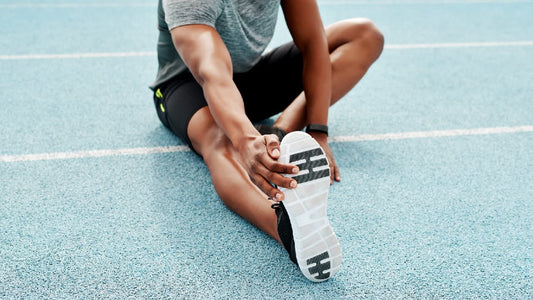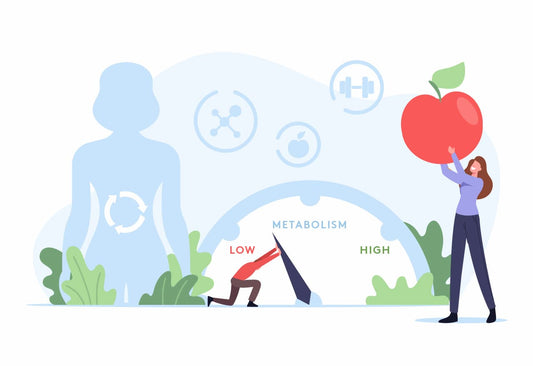Chances are that if you're in the midst of a vigorous training session, you can't afford to be benched by injury, fatigue, or pain.
We know you're serious about your training, and you're putting in the work day in and day out for the best results possible. But have you ever felt like you're placing unreasonable demands on your body?
Your body is saying sleep but your mind is telling you to get out of bed and workout? Or despite being sore all over, you continue to push through the next day's training schedule? If you're someone who's putting in hour-long training sessions a few times a week, chances are you aren't overtraining. But if you're hitting up doubles daily and training is an addiction with the no-days-off mentality, you're treading into risky territory. If that's you, it may be time to reassess your training program. While going hard isn't a bad thing, going too hard too often can mean you're setting yourself up for injury.
Regardless of how often you hit the gym, knowing the signs of overtraining is important to prevent performance decrements or injury and to keep your progress on track.
What Is Overtraining Syndrome?
In general, athletes train to increase their performance, which is achieved by boosting training loads to increase the stress on their muscles and nervous system.
The only way the body can tolerate increased loads, however, is to intersperse work with periods of rest and recovery. It's what we call training periodization 1.
When overreaching happens—an accumulation of training loads that results in performance decrements rather than improvements—it can require days, sometimes weeks of recovery.
And when overreaching is combined with additional stressors, it can lead to the development of overtraining syndrome (OTS). This frequently happens when athletes train too frequently without allowing sufficient recovery time between sessions.
The main cause of OTS in athletes is systemic inflammation and the subsequent effects on the central nervous system 1, which includes mood changes, central fatigue, and neurohormonal changes.
However, OTS doesn't just happen—there are warning signs.
The European College of Sport Science outlines the various levels of OTS 2:
- Functional overreaching: Increased training that leads to a temporary performance decrement that can last days to weeks, followed by improved performance after rest. The outcome is super-compensation.
- Nonfunctional overreaching: Intense training that leads to a more prolonged performance decrement of weeks to months, but full recovery can happen after rest. This is usually accompanied by increased psychological and/or neuroendocrinological symptoms.
- Overtraining syndrome: Consistent with extreme nonfunctional overreaching but with a longer performance decrement (> 2 months), more severe symptomatology, physiological maladaptation (psychologic, neurologic, endocrinologic, immunologic systems), and additional stressors that can't be explained by another disease.
We want to avoid OTS at all costs, as it can end an athlete's career when severe enough.
Simply put, overreaching is the first step towards overtraining. If you ignored the signs of overreaching and continue to train because you believe that weakness or poor performance signals the need to train even harder, you're approaching overtraining and only breaking the body down further.
5 Signs You're Overtraining
Not sure what to look for with overtraining? Here are the most common signs and symptoms that you may be going too hard and in desperate need of a little R&R 1:
You're constantly sore
We're all familiar with the achy muscles that happen a couple of days after an intense training session, but when that muscle soreness doesn't dissipate, it could mean you're pushing yourself too hard and your body is staying in a chronic state of inflammation.
The cytokine hypothesis of OTS suggests that OTS is a physiologic adaptation/maladaptation to excessive stress placed on the body that is triggered by an imbalance between training and recovery 3, 4.
Muscle contraction and repetitive joint action result in microtrauma to muscle tissue that, through adaptation, heals and strengthens via activation of local inflammatory response and recruitment of cytokines.
However, a lack of rest and recovery can amplify the inflammatory response, which eventually results in a chronic, pathological, and systemic inflammatory response throughout the body.
Another theory suggests that although some level of oxidative stress is beneficial for repairing damaged muscles, pathologic oxidative stress can result in inflammation, muscle fatigue, and increased muscle soreness 5.
You're hitting performance plateaus
Performance decrements and plateaus are some of the characteristic signs of overtraining 1.
Research finds that there may be imbalances within the sympathetic/parasympathetic nervous system followed by alterations in HPA axis activity and feedback, which can lead to numerous effects that result in exhaustion and poor performance 6, 7.
Dysregulation of the HPA axis also leads to increased serum concentrations of cortisol, which further results in widespread neurochemical, hormonal, and immune abnormalities.
Athletes going after muscle growth or strength gains but still overtraining - you're going in the wrong direction.
As we mentioned before, training causes microtrauma to muscle tissue that requires time to repair. If you're not providing sufficient time to repair these tears, all you're doing is re-tearing them next time you train so they never have an opportunity to mend and grow.
Muscles need an opportunity to repair, and that's only possible when your body is given enough time to rest and recover before being forced into more exercise.
Basically, if you're putting in the work and not seeing results, it may be time to reconsider your training and recovery strategy.
You're gaining weight (but not muscle)
As we just said, excessive exercise and overtraining can result in increased secretion of cortisol, which is a catabolic hormone that also triggers fat storage.
As a result, testosterone (your muscle-building hormone) levels start to decline—cortisol and testosterone levels exhibit an inverse relationship—and we see a loss of muscle tissue, weight gain, and excess belly fat.
You're always tired
It's normal to feel a bit tired after training, but chronic exhaustion and fatigue happen when your body isn't recovering to its full capacity.
Some research suggests that fatigue in overtrained athletes may be the result of increasing levels of sensitivity to 5-HT (serotonin) 1. Exercise causes an increase in unbound tryptophan, which competes with the BCAAs for entry into the brain; exercise also decreases BCAA concentration, thereby allowing tryptophan to enter the brain and convert to serotonin 8, 9.
But keep in mind that fatigue can also kick in when you're not fueling up properly before a training session, so you're essentially working from a gas tank that's on empty. If you're consuming a solid pre-workout meal and are still feeling fatigued, chances are your body needs more recovery time.
Insomnia
The main complaint of athletes dealing with overtraining is underperformance. They will ignore all the warning signs that their body needs rest, and sleep disturbances are a major sign.
Research shows that sleep disturbances occur in more than 90% of overtraining cases with athletes having difficulty falling asleep, nightmares, waking in the night, and waking up feeling unrefreshed 10. Studies also show that both sleep quantity and quality decline following augmented increases of >30% in training load 11.
But the thing is that insomnia just exacerbates the cycle of poor recovery, as sleep is considered to be a critical component for both physical and mental recovery from exercise.
Why Recovery Is Important + How To Recover From Overtraining
A lot of athletes prioritize their training over everything else. It's what's going to make them bigger, faster, stronger, and more powerful. But the truth is, none of that is going to happen without proper recovery. Gains aren't made during training—they're made during recovery.
All of the stress that the body undergoes during training—microtears to muscle, lactic acid accumulation, muscle glycogen depletion—may not sound particularly beneficial until you factor in recovery post-exercise.
When you create an environment for healing, muscle tissue can repair; metabolic waste can be excreted, and your energy supply can be replenished. As a result, your body adapts to the stress and turns it into a performance advantage.
So, how do we do that and beat overtraining?
Sleep
At a bare minimum you should be getting 7 hours of quality, uninterrupted sleep daily.
For athletes, sleep is critical for the release of growth hormone and testosterone (for men), both of which play essential roles in muscle repair and recovery, and the majority of release happens during deep, slow-wave sleep 12.
Lack of sleep also increases muscle degradation pathways and contributes to loss of muscle and hinders muscle recovery after damage 13.
Diet
If you want to grow, you need to eat to support growth. That means adequate protein at every meal to facilitate muscle protein synthesis and muscle repair, along with complex carbohydrates to replenish glycogen stores, and healthy fats to support hormone production and nutrient absorption.
While the macro ratios may vary between athletes, they're all still a critical part of supporting proper recovery because nutritional stress is a real thing. When the body doesn't have what it needs to do its job, it can't do it.
Stress management
Stress can curb your body's ability to recover faster than the drop of a hat. We're not just talking about psychological or emotional stress, but physical stress from intense training is a massive form of stress.
The stress hormone cortisol is catabolic by nature, which means that it's going to break down tissue rather than build it up. Not to mention that it's going to mess with your sleep, which is another critical piece of the recovery puzzle. So, whether you like deep breathing or taking a walk in nature, find ways to mitigate stress.
Recovery techniques
A lot of people resort to foam rolling and stretching for dynamic recovery, but that's not the only place you can go. Hit the sauna, try cryotherapy or red light therapy, go for an ice bath, try cupping or massage. There's no end to recovery techniques that can facilitate muscle repair and get you back on track to training.
Supplements
While supplements alone aren't going to cure overtraining syndrome, they can go a long way to support proper nourishment post-workout. Things like Performance Lab Carb are specifically designed to support your recovery and get you back on track faster and stronger.
Final Thoughts
Ideally, you want to aim for functional overreaching—the state that occurs when intensified training leads to a temporary decline in performance, which is followed by a super-compensatory increase in performance with proper recovery.
Functional overreaching means you're respecting the balance between training and recovery, and while recovery may take up to a few weeks, at the end of the day you're seeing the full benefits of strength and power gains.
Unlike non-functional overreaching, functional overreaching and proper recovery turns the hormetic stress of intense training into performance gains—and that's exactly what we want!
While finding the balance between training and recovery can seem like a never-ending battle, remember that the "more is better" training mentality that fuels the fitness industry isn't necessarily the best ideology to follow.
Train smarter, not harder. It's the key to unlocking your potential and massive performance gains.
References
- JB Kreher, JB Schwartz. Overtraining syndrome: a practical guide. Sports Health. 2012;4(2):128-138.
- R Meeusen, M Duclos, M Gleeson, et al. Prevention, diagnosis and treatment of the overtraining syndrome: ECSS Position Statement Task Force. Eur J Sport Sci. 2006;6(1):1-14
- P Robson. Elucidating the unexplained underperformance syndrome in endurance athletes : the interleukin-6 hypothesis. Sports Med. 2003;33(10):771-781.
- LL Smith. Cytokine hypothesis of overtraining: a physiological adaptation to excessive stress?. Med Sci Sports Exerc. 2000;32(2):317-331.
- M Tanskanen, M Atalay, A Uusitalo. Altered oxidative stress in overtrained athletes. J Sports Sci. 2010;28(3):309-317.
- SL Halson, AE Jeukendrup. Does overtraining exist? An analysis of overreaching and overtraining research. Sports Med. 2004;34(14):967-981.
- M Lehmann, C Foster, J Keul. Overtraining in endurance athletes: a brief review. Med Sci Sports Exerc. 1993;25(7):854-862.
- R Budgett, E Newsholme, M Lehmann, et al. Redefining the overtraining syndrome as the unexplained underperformance syndrome. Br J Sports Med. 2000;34(1):67-68.
- LE Armstrong, JL VanHeest. The unknown mechanism of the overtraining syndrome: clues from depression and psychoneuroimmunology. Sports Med. 2002;32(3):185-209.
- R Budgett. Fatigue and underperformance in athletes: the overtraining syndrome. Br J Sports Med. 1998;32(2):107-110.
- M Lastella, GE Vincent, R Duffield, et al. Can Sleep Be Used as an Indicator of Overreaching and Overtraining in Athletes?. Front Physiol. 2018;9:436
- E Van Cauter, L Plat. Physiology of growth hormone secretion during sleep. J Pediatr. 1996;128(5 Pt 2):S32-S37.
- M Dattilo, HK Antunes, A Medeiros, et al. Sleep and muscle recovery: endocrinological and molecular basis for a new and promising hypothesis. Med Hypotheses. 2011;77(2):220-222.















